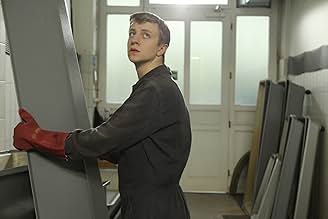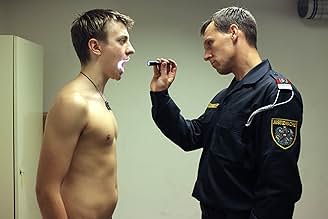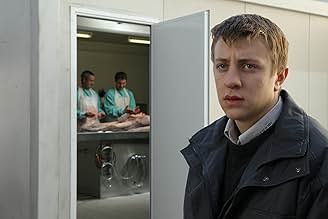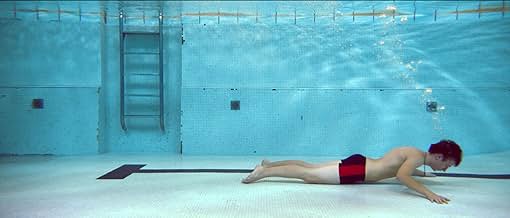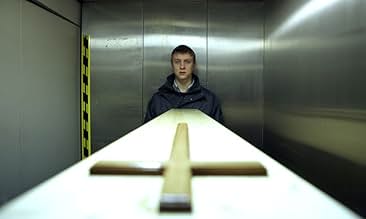AVALIAÇÃO DA IMDb
7,0/10
3,1 mil
SUA AVALIAÇÃO
Adicionar um enredo no seu idiomaThrough his work at a morgue, an incarcerated young man trying to build a new life starts to come to terms with the crime he committed.Through his work at a morgue, an incarcerated young man trying to build a new life starts to come to terms with the crime he committed.Through his work at a morgue, an incarcerated young man trying to build a new life starts to come to terms with the crime he committed.
- Prêmios
- 19 vitórias e 8 indicações no total
Luna Lozic
- Mona
- (as Luna Mijovic)
Avaliações em destaque
This is yet another brilliant Austrian film. It is the directing debut of the well-known Austrian actor Karl Markovics and it is a stunning first film. Perhaps the main reason for this is the acting of Thomas Schubert in the main role. Seldom has a young guy so quietly taken over the big screen and he lives and breathes his character so thoroughly that it's almost hard to believe you are watching a movie and not a documentary. All the supporting actors are likewise presented in a very realistic mode. It is filmed under overcast skies (yes, Vienna has many days of sunshine but not in this film.) When the film quietly ends in a pan-out of another overcast sky, you realize how touched you are by Roman (Thomas Schubert) the main character who's trying to find a path he can travel on through life. Thumbs up!!
10EdgarST
Minds that have become sick from watching so much violent and mindless cinema ask for violence in their film diet. For them «Breathing» is a 'movie' in which there is no drama, nothing happens, and it is slow. But this drama is so dramatic (deliberately redundant) that to make it explicit would be cacophonic.
Roman Kogler (Thomas Schubert) was abandoned by his mother, he is 19 years old and has always lived in a reformatory, where he murdered another boy. He does not understand himself, he is lapidary, others do not like him, and I think he himself does not either; he spends long sessions in the prison pool, forcing apnea time at the bottom of the pool, putting his life in danger, but something, a hunch or perhaps the insistence of his probation counselor impels him to grow, to reach 20 and get out of the prison and his shell.
Roman is so closed to the exterior that, among all the job offers, he opts for a position in the city morgue. And day by day, he goes from one place to another with his work group, discovering what life means to others and the pain of loss, while a girl shows him that he is attractive enough and worthy of trust, a smile and a beer, sharing a pleasant trip from the morgue to the prison; a hard co-worker reveals himself as an alternate father and friend, and above all, one unexpected day something happens to him that will change his life forever, when he discovers that his biological mother has not died.
This multi-level emotional action-reaction plot of situations that reveal dark corners of the human essence was written and directed by Karl Markovics, the celebrated actor in the Oscar-winning film "The Counterfeiter." An outstanding theater, film, and TV actor, in this, his debut feature, Markovics reveals himself as a magnificent delineator of characters with notable psychological strength and richness. He had the valuable contribution of actor Thomas Schubert (who was only 17 years old when filming), in a measured, calculated and therefore surprising performance in the role of Roman; actress Karin Lischka in a composition cared for in detail, as Roman's mother, and Herbert Tucmandl's beautiful music used with measure and precision.
I recommend opening our visors to world cinemas and let the American industry with its Netflix, TV series and superheroes cool down for a while, to see if it generates good films again, as in the 1970-80s. The benefit of enjoying different cinemas is immediately felt as we start a good diet with these productions. Thus, we do not miss works like this and others that emerge in Austria, such as Michael Haneke's films, just to mention its most recognized filmmaker.
«Breathing» won the awards for best film, director, screenwriter, actor (Schubert), film editing and music from the Austrian Film and TV Industry, the prize for best European film at the Cannes film festival, the awards for best film and actor at the Sarajevo film festival, and the Best International Film award at the São Paulo festival, among many other recognitions.
Roman Kogler (Thomas Schubert) was abandoned by his mother, he is 19 years old and has always lived in a reformatory, where he murdered another boy. He does not understand himself, he is lapidary, others do not like him, and I think he himself does not either; he spends long sessions in the prison pool, forcing apnea time at the bottom of the pool, putting his life in danger, but something, a hunch or perhaps the insistence of his probation counselor impels him to grow, to reach 20 and get out of the prison and his shell.
Roman is so closed to the exterior that, among all the job offers, he opts for a position in the city morgue. And day by day, he goes from one place to another with his work group, discovering what life means to others and the pain of loss, while a girl shows him that he is attractive enough and worthy of trust, a smile and a beer, sharing a pleasant trip from the morgue to the prison; a hard co-worker reveals himself as an alternate father and friend, and above all, one unexpected day something happens to him that will change his life forever, when he discovers that his biological mother has not died.
This multi-level emotional action-reaction plot of situations that reveal dark corners of the human essence was written and directed by Karl Markovics, the celebrated actor in the Oscar-winning film "The Counterfeiter." An outstanding theater, film, and TV actor, in this, his debut feature, Markovics reveals himself as a magnificent delineator of characters with notable psychological strength and richness. He had the valuable contribution of actor Thomas Schubert (who was only 17 years old when filming), in a measured, calculated and therefore surprising performance in the role of Roman; actress Karin Lischka in a composition cared for in detail, as Roman's mother, and Herbert Tucmandl's beautiful music used with measure and precision.
I recommend opening our visors to world cinemas and let the American industry with its Netflix, TV series and superheroes cool down for a while, to see if it generates good films again, as in the 1970-80s. The benefit of enjoying different cinemas is immediately felt as we start a good diet with these productions. Thus, we do not miss works like this and others that emerge in Austria, such as Michael Haneke's films, just to mention its most recognized filmmaker.
«Breathing» won the awards for best film, director, screenwriter, actor (Schubert), film editing and music from the Austrian Film and TV Industry, the prize for best European film at the Cannes film festival, the awards for best film and actor at the Sarajevo film festival, and the Best International Film award at the São Paulo festival, among many other recognitions.
Thomas Schubert is Roman Kogler, a kid who's serving time in a juvenile detention center. He has a day job as a morgue attendant. He is socially awkward and can't connect with anybody. Can he find the connection that he so desperately need?
This movie moves rather slowly. It meanders along as we follow Roman around. There isn't anything dramatic going on until the final third of the movie. So we're relying on this being a character study. A character study has major problems here. The actor is not charismatic and the character is supposed to be withdrawn. Again that doesn't make for compelling watching. A final reveal is very enlightening about his incarceration. However, I think a violent action scene at the beginning would inject much needed tension into this character. It would serve the movie much better to see the incident at the beginning rather than hear about it at the end.
This movie moves rather slowly. It meanders along as we follow Roman around. There isn't anything dramatic going on until the final third of the movie. So we're relying on this being a character study. A character study has major problems here. The actor is not charismatic and the character is supposed to be withdrawn. Again that doesn't make for compelling watching. A final reveal is very enlightening about his incarceration. However, I think a violent action scene at the beginning would inject much needed tension into this character. It would serve the movie much better to see the incident at the beginning rather than hear about it at the end.
Karl Markovics's "Atmen" ("Breathing" in English) focuses on a youth's emotional awakening and the issue of morality in our lives. The movie both gives the viewer a glimpse into the youth's life as he gets a job as a mortuary attendant while still in a juvenile detention center, but also how he has to confront the crime that put him juvie. There are also several shots of the environs of Vienna. I thought that the most effective scenes were the train, showing him going to and from the juvenile detention center, and how the advertisement comes into view, or vanishes.
I'd say that this was the right movie for Austria to submit for its nomination for Best Foreign Language Film at the Academy Awards. Addressing matters of incarceration, ethics, and relationships, it hits the right notes.
I'd say that this was the right movie for Austria to submit for its nomination for Best Foreign Language Film at the Academy Awards. Addressing matters of incarceration, ethics, and relationships, it hits the right notes.
Karl Markovics had to work hard to escape his signature role as Stockinger, the funny sidekick in the popular TV show "Kommissar Rex". It took a lot of "serious" theater work and the leading role in Stefan Ruzowitzky's Academy Award winning "Die Fälscher" until he finally got the respect he deserved as an actor. Now Markovics goes on to prove his talents extend beyond just acting: "Atmen" is his debut as a writer and director - and he hits the bull's eye on the first try.
Apparently, Markovics has worked on a lot of script ideas over the years, but never deemed any of them good enough to be developed into a movie. Finally his wife convinced him to go through with one of those ideas, and rightfully so. "Atmen" is an artistic triumph. Not only is the script brilliantly written, but it is also flawlessly executed. The direction seems almost effortless, as if Markovics was already an old master. He seems to know intentionally what to show when, he's got a great eye for frames and unagitated pictures, and, an actor himself, he naturally knows how to direct other actors. That's not to take away from the great cast. Veteran stars like Georg Friedrich and Karl Rott don't disappoint, but the focus lies on Thomas Schubert who says a lot with just facial expressions. Obviousl,y the movie's success depended on Schubert's performance and the first time actor lives up to the task. He's a great talent. Hopefully we'll see more of him in the future.
"Atmen" is a touching and believable movie about life and death, tight-lipped, but never boring, bleak, but in the end optimistic. It's very authentic in its depiction of Vienna, its depiction of a boy who hasn't been dealt the best cards in life. And, most of all, it's got its heart in the right place. This really deserves an Oscar win - much more than "Die Fälscher" did, actually.
Apparently, Markovics has worked on a lot of script ideas over the years, but never deemed any of them good enough to be developed into a movie. Finally his wife convinced him to go through with one of those ideas, and rightfully so. "Atmen" is an artistic triumph. Not only is the script brilliantly written, but it is also flawlessly executed. The direction seems almost effortless, as if Markovics was already an old master. He seems to know intentionally what to show when, he's got a great eye for frames and unagitated pictures, and, an actor himself, he naturally knows how to direct other actors. That's not to take away from the great cast. Veteran stars like Georg Friedrich and Karl Rott don't disappoint, but the focus lies on Thomas Schubert who says a lot with just facial expressions. Obviousl,y the movie's success depended on Schubert's performance and the first time actor lives up to the task. He's a great talent. Hopefully we'll see more of him in the future.
"Atmen" is a touching and believable movie about life and death, tight-lipped, but never boring, bleak, but in the end optimistic. It's very authentic in its depiction of Vienna, its depiction of a boy who hasn't been dealt the best cards in life. And, most of all, it's got its heart in the right place. This really deserves an Oscar win - much more than "Die Fälscher" did, actually.
Você sabia?
- CuriosidadesThe film was selected as Austria's submission to the 84th Academy Awards for Best Foreign Language Film, but it did not make the final shortlist.
Principais escolhas
Faça login para avaliar e ver a lista de recomendações personalizadas
- How long is Breathing?Fornecido pela Alexa
Detalhes
- Data de lançamento
- País de origem
- Central de atendimento oficial
- Idiomas
- Também conhecido como
- Breathing
- Locações de filme
- Empresas de produção
- Consulte mais créditos da empresa na IMDbPro
Bilheteria
- Orçamento
- € 1.000.000 (estimativa)
- Faturamento bruto nos EUA e Canadá
- US$ 4.630
- Fim de semana de estreia nos EUA e Canadá
- US$ 949
- 2 de set. de 2012
- Faturamento bruto mundial
- US$ 807.436
- Tempo de duração
- 1 h 34 min(94 min)
- Cor
- Mixagem de som
- Proporção
- 2.35 : 1
Contribua para esta página
Sugerir uma alteração ou adicionar conteúdo ausente


